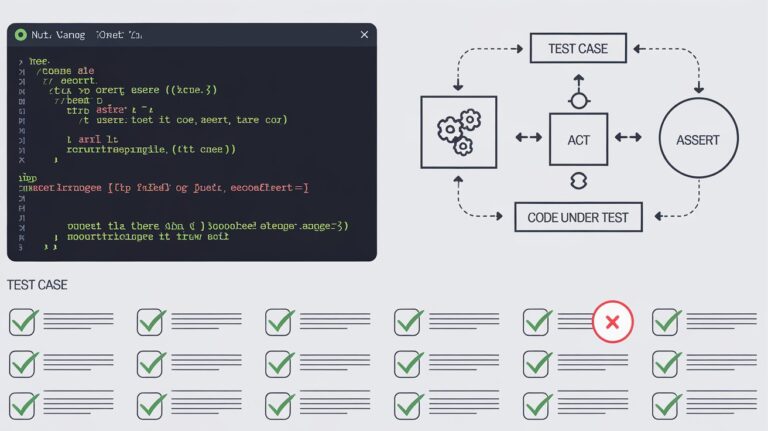Course Overview:
This course provides an in-depth look into unit testing in .NET and C# using NUnit and Moq. It covers the core principles of unit testing, best practices, and the application of NUnit for testing and Moq for creating effective test doubles (mocks). Through hands-on exercises and real-world examples, learners will build confidence in writing clean, maintainable, and robust unit tests.
Course Objectives:
By the end of this course, learners will be able to:
- Understand the fundamentals of unit testing and test-driven development (TDD)
- Write and run unit tests in .NET using NUnit
- Apply Moq for creating mock objects to isolate test cases
- Design, structure, and maintain testable code
- Use best practices to enhance test readability, reliability, and performance
Course Outlines:
Module 1: Introduction to Unit Testing and TDD
- Description: Understand the purpose and benefits of unit testing and TDD (Test-Driven Development). This module covers essential testing concepts and methodologies to ensure learners have a solid foundation before diving into NUnit and Moq.
- Topics Covered:
- What is Unit Testing?
- Types of Software Testing: Unit, Integration, and System Testing
- Advantages of Unit Testing and TDD
- Overview of NUnit and Moq
Module 2: Setting Up the Testing Environment
- Description: Set up a .NET testing environment with NUnit and Moq. This module covers the installation and configuration of the tools required to follow along with the course.
- Topics Covered:
- Installing NUnit and Moq using NuGet
- Structuring a Testing Project
- Best Practices for Setting Up the Test Environment
Module 3: Writing Unit Tests with NUnit
- Description: Dive into NUnit, learning how to write effective unit tests. This module includes detailed examples to help you build various test cases.
- Topics Covered:
- NUnit Basics: Test Attributes and Assertions
- Structuring Tests: Arrange, Act, Assert
- Running and Analyzing Test Results
- Handling Expected Exceptions
Module 4: Mocking with Moq
- Description: Learn the principles and applications of mock objects to isolate dependencies. This module introduces Moq to create test doubles that simulate complex or external dependencies in unit tests.
- Topics Covered:
- What is Mocking?
- Creating Mock Objects with Moq
- Configuring Mock Behavior
- Verifying Method Calls on Mocks
Module 5: Advanced NUnit and Moq Techniques
- Description: Enhance your unit tests with advanced NUnit and Moq features, enabling more sophisticated testing scenarios.
- Topics Covered:
- Data-Driven Testing in NUnit (TestCase, TestFixture)
- Mocking Advanced Scenarios: Stubbing, Callbacks, and Setup
- Testing Asynchronous Code
- Working with Static and Sealed Classes
Module 6: Structuring and Organizing Tests for Large Projects
- Description: Best practices for structuring and organizing tests within larger projects. This module covers strategies to keep tests maintainable, organized, and efficient as the test suite grows.
- Topics Covered:
- Test Naming Conventions and Best Practices
- Organizing Tests by Module, Feature, and Layer
- Maintaining Clean Code in Test Suites
- Using Test Helpers and Common Setup Code
Module 7: Testing Best Practices and Avoiding Common Pitfalls
- Description: Learn to improve test quality and reliability by adhering to best practices and avoiding common mistakes.
- Topics Covered:
- Writing Tests that are Clear, Consistent, and Maintainable
- Avoiding Over-Mocking and Tight Coupling with Implementation
- Identifying and Fixing Flaky Tests
- Ensuring Test Independence and Idempotence
Module 8: Continuous Integration and Test Automation
- Description: Explore how to integrate unit tests into continuous integration (CI) pipelines and automate test execution for improved development workflows.
- Topics Covered:
- Integrating Unit Tests with CI/CD (e.g., GitHub Actions, Azure DevOps)
- Setting Up Automated Test Execution
- Generating and Reviewing Test Reports
- Incorporating Unit Tests in Build Pipelines
Module 9: Real-World Scenarios and Case Studies
- Description: Apply the learned techniques to real-world scenarios and case studies to solidify your knowledge and experience in unit testing with NUnit and Moq.
- Topics Covered:
- Testing in Legacy Systems vs. New Development
- Mocking in Complex Systems with Multiple Dependencies
- Case Study: Writing Unit Tests for a Payment Processing Module
- Case Study: Unit Testing in an eCommerce Application
Module 10: Course Wrap-Up and Next Steps
- Description: Review the key topics covered and discuss next steps for advancing skills in unit testing.
- Topics Covered:
- Review of Core Concepts and Techniques
- Tips for Continuous Learning in Testing
- Resources for Further Study
Target Audience:
This course is ideal for software developers, quality assurance engineers, and technical leads working with .NET and C# who want to learn effective unit testing using NUnit and Moq.




